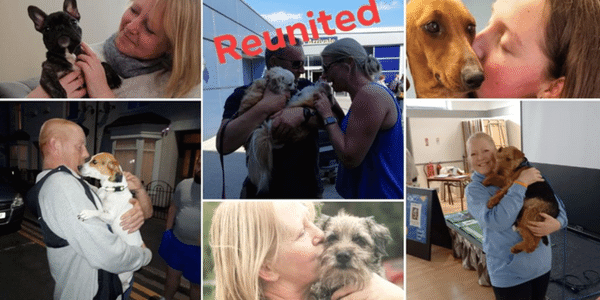
Lisa Dean is the founder of Beauty’s Legacy, a registered charity with a team of volunteers across the UK that work alongside other groups and agencies, including the police, local authority dog wardens, liaison officers and animal welfare organisations to reunite lost and stolen animals as well as promoting animal welfare.
DNA Protected interviewed Lisa Dean for Pet Theft Awareness Week (14th – 21st Mar) to get an insight into her experience of dog theft, how to prevent it and if the worst were to happen, what to do to give people the best chance of getting their dog back.
Q: Tell us a bit about what you do day to day?
A: I work full time for the charity and get calls on a daily basis from people who have lost their dog, or it’s been stolen. I either work on the case myself or allocate it to another volunteer that’s local to the person that called. We support people that have lost their pets, but we are becoming more well known for helping people who have had their dog stolen either directly or it’s got lost and then been picked up and stolen off the street. Sometimes thieves drive round with a van and pick up lost dogs.
We also help find other types of animals such cats, birds of prey and even a ferret recently.
Q: In 2020 during the pandemic dog theft was in the media a lot and dog theft increased, has it slowed down since?
A: Maybe a little, but it seems to be more organised now, dogs that are good for breeding are targeted especially, and overall, it’s still a real problem in the UK right now and the figures provided by the police don’t really reflect the full extent of the problem.
It’s terrible that stolen male dogs are given testosterone to make them more easily aroused for breeding, but unfortunately it also makes them more aggressive. Male dogs that are kept together often fight and when recovered they often come back with bite marks.
Stolen female dogs have it the worst, they are given a hormone to bring them into season. They have their puppies and then are brought back into season again as soon as possible. This over breeding is extremely bad for their health, and we do find some discarded dogs with oversized teats and poor health or are even near to death because of the over breeding.
Dogs are being stolen off the street if lost or unattended, from cars, outside shops, gardens, kennels, and people are breaking and entering into people houses to get access to dogs and steal them.
Q: What are the most important things people can do to protect their dog from theft and if the worst were to happen to help recovery?
A:
-
Firstly, cameras; video doorbells are quite cheap to install these days or CCTV, dashcams or internal cameras at home, these can be used to gather valuable evidence when investigating who’s stolen your dog.
-
Don’t leave your dog unattended outside a shop, in the garden or let your dog run off out of sight on a walk.
-
Keep your microchip details up to date. Although microchips can be removed, dogs can also be double chipped, or the chips can fail.
-
Use DNA Protected so there is a record of your dog’s DNA profile on the Forensic Dog DNA Database that’s accessible by the police when they recover dogs. The dog’s DNA profile can also be used to prove ownership if there is a dispute when a dog is recovered, and it provides more evidence for the police when prosecuting people for dog theft crime.
-
Try not to provide too much information about your dog on social media and do not give an indication of when your dog could be home alone.
-
If you are not intending to breed from your dogs, get them neutered so they are less attractive to thieves
Q: Tell us more about a recent case where you recovered a stolen dog.
A: We recently recovered a stolen dog called Buddy, an adult pug cross. He was stolen from a mother fighting cancer and Buddy was a detection dog for her daughter with epilepsy. When we finally got him back he was lame, underweight, had rodent bites, cigarette burns and had developed fear aggression. He needed vet treatment and that was paid for by the charity through fundraising. You can see more of Buddy’s story on our social media.

Pussy, a Welsh terrier, was recovered 14 months after she was stolen and as you can see below she was almost unrecognisable. Her microchip had been removed but luckily the owner had her parents so we could use DNA to reunite her. It’s a good example of how DNA can be pivotal in beating the dog theft epidemic.

Q: You are a charity; how do you raise funds and resource to support the fantastic work you do?
A: People that we help recover dogs for often donate or even become volunteers themselves to help the cause in their area. We get one off donations from generous people and some of our contacts organise family fun days and other events to raise funds so we can continue the work. Having Chris Packham CBE as our patron has also helped raise our profile.
Q: Is there anything else you would like to mention?
A: When someone loses their pet or it’s stolen, it’s incredibly stressful for the owners and it takes a real emotional toll on them and their family. Not only do we work to recover pets we also offer practical and emotional support to the owners through the process and beyond if required. For us, that care and support is as important as the recovery of the animal.
Find out more about Beauty’s Legacy on their website www.beautyslegacy.co.uk along with details of how to donate and follow them on social.
